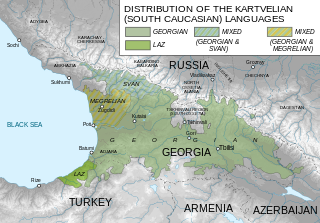
Back Ақырҭуа бызшәа Abkhazian Хъырцыбзэ ADY Georgies Afrikaans Georgische Sprache ALS ጂዮርጅኛ Amharic Idioma cheorchiano AN Georgisc sprǣc ANG اللغة الجورجية Arabic ܠܫܢܐ ܓܘܪܓܝܐ ARC لغه چورچى ARZ
| Georgian | |
|---|---|
| kartuli ena | |
| ქართული ენა | |
 Kartuli written in Georgian script | |
| Pronunciation | [ˈkʰartʰuli ˈena] |
| Native to | Georgia |
| Region | South Caucasus |
| Ethnicity | Georgians |
| speakers | L1: 3.76 million (2020)[1] L2: 150,000 (2014)[1] |
Kartvelian
| |
Early form | |
| Dialects | |
| Official status | |
Official language in | |
| Regulated by | Cabinet of Georgia |
| Language codes | |
| ISO 639-1 | ka |
| ISO 639-2 | geo (B) kat (T) |
| ISO 639-3 | kat |
| Glottolog | nucl1302 |
| Linguasphere | 42-CAB-baa – bac |
 | |
Georgian (ქართული ენა, romanized: kartuli ena, pronounced [ˈkʰartʰuli ˈena]) is the most widely spoken Kartvelian language; it serves as the literary language or lingua franca for speakers of related languages.[2] It is the official language of Georgia and the native or primary language of 88% of its population.[3] Its speakers today amount to approximately 3.8 million. Georgian is written in its own unique alphabet.[1]
Georgian is most closely related to the Zan languages (Megrelian and Laz) and more distantly to Svan. Georgian has various dialects, with standard Georgian based on the Kartlian dialect, and all dialects are mutually intelligible. The history of Georgian spans from Early Old Georgian in the 5th century, to Modern Georgian today. Its development as a written language began with the Christianization of Georgia in the 4th century.
Georgian phonology features a rich consonant system, including aspirated, voiced, and ejective stops, affricates, and fricatives. Its vowel system consists of five vowels with varying realizations. Georgian prosody involves weak stress, with disagreements among linguists on its placement. The language's phonotactics include complex consonant clusters and harmonic clusters. The Mkhedruli script, dominant in modern usage, corresponds closely to Georgian phonemes and has no case distinction, though it employs a capital-like effect called Mtavruli for titles and inscriptions. Georgian is an agglutinative language with a complex verb structure that can include up to eight morphemes, exhibiting polypersonalism. The language has seven noun cases and employs a left-branching structure with adjectives preceding nouns and postpositions instead of prepositions. Georgian lacks grammatical gender and articles, with definite meanings established through context. Georgian's rich derivation system allows for extensive noun and verb formation from roots, with many words featuring initial consonant clusters.
The Georgian writing system has evolved from ancient scripts to the current Mkhedruli, used for most purposes. The language has a robust grammatical framework with unique features such as syncope in morphophonology and a left-branching syntax. Georgian's vocabulary is highly derivational, allowing for diverse word formations, while its numeric system is vigesimal, and it includes notable dictionaries like the "Explanatory dictionary of the Georgian language." The language's phonological and grammatical complexity makes it distinct within the Kartvelian family.
- ^ a b c Georgian at Ethnologue (27th ed., 2024)

- ^ Hiller (1994:1)
- ^ Central Intelligence Agency. (2016). "Georgia". In The World Factbook. Archived 2021-02-04 at the Wayback Machine.
© MMXXIII Rich X Search. We shall prevail. All rights reserved. Rich X Search